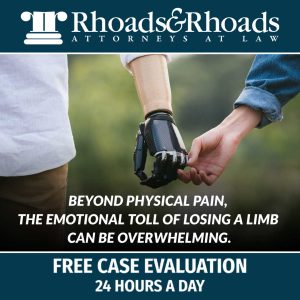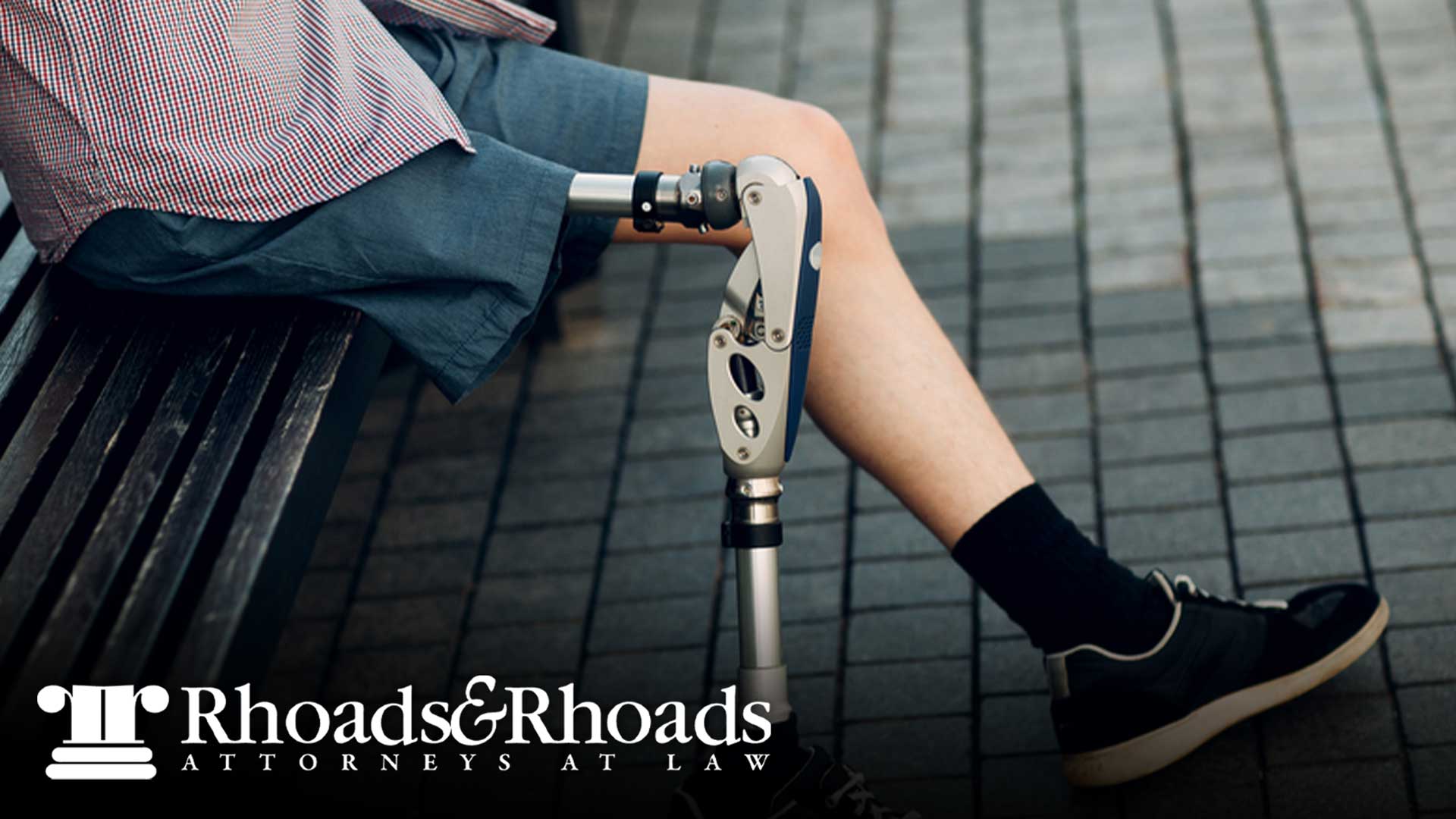Amputation Injury Lawyer in Owensboro, Kentucky
 An amputation injury can leave victims unable to work or engage in daily activities, creating a substantial emotional and financial burden. Healthcare expenses quickly add up since those suffering from severe injuries often face a lifetime of medical care and treatment. An amputation injury lawyer in Owensboro, Kentucky, can quickly become necessary.
An amputation injury can leave victims unable to work or engage in daily activities, creating a substantial emotional and financial burden. Healthcare expenses quickly add up since those suffering from severe injuries often face a lifetime of medical care and treatment. An amputation injury lawyer in Owensboro, Kentucky, can quickly become necessary.
Navigating the legal process can be overwhelming, which is why having a dedicated personal injury attorney on your side can make all the difference. Our Kentucky personal injury lawyers specialize in personal injury law and understand the complexities of personal injury cases involving traumatic injuries like amputation and what it takes to fight for fair compensation.
At Rhoads & Rhoads, we offer a free consultation to assess your case and provide you with the guidance you need. We work on a contingency fee basis, meaning you don’t pay legal fees unless we win your personal injury lawsuit. If you’ve sustained a life-altering injury, contact our personal injury law firm today for a free consultation: 888-709-9329.
Steps in an Amputation Injury Case
When you experience a traumatic amputation injury, you may not be sure where to start. The legal process for filing a Kentucky personal injury claim can be complex, but with the help of Rhoads & Rhoads personal injury attorneys, you can navigate it successfully. Here are the key steps involved in an amputation injury case in Kentucky:
- Consultation With a Personal Injury Attorney: After your personal injury accident, the first step is to schedule a free initial consultation with a personal injury attorney. During this meeting, the lawyer will assess the severity of your injuries and explain your legal options.
- Investigation of Evidence: Our legal team will conduct a thorough investigation into the circumstances of your injury. This includes reviewing medical records, accident reports, witness statements, and any available insurance coverage details.
- Filing a Personal Injury Lawsuit: If the responsible party refuses to settle, we will file a personal injury claim on your behalf. This lawsuit can seek compensation for medical expenses, lost income, and pain and suffering.
- Negotiating a Settlement: Often, we can reach a fair settlement through negotiations with the defendant’s insurance company. However, if the settlement offer is insufficient, we may proceed to trial.
- Litigation Process: If your case goes to court, our qualified Kentucky personal injury attorneys will guide you through the litigation process to secure the compensation you deserve.
We understand that amputation injuries are serious injuries that require careful attention and expert legal representation. Our personal injury lawyers are committed to ensuring you get the best outcome possible.
How is an Amputation Injury Different From a Loss of Limb
 Amputation injuries and the loss of a limb share similarities, but they are distinct in important ways. An amputation injury refers specifically to the surgical removal of a limb due to a traumatic event, such as a car accident or workplace accident, where the damage to the limb is too severe to repair.
Amputation injuries and the loss of a limb share similarities, but they are distinct in important ways. An amputation injury refers specifically to the surgical removal of a limb due to a traumatic event, such as a car accident or workplace accident, where the damage to the limb is too severe to repair.
On the other hand, the loss of a limb may also result from medical conditions like diabetes or vascular disease rather than an accident or injury. In both cases, however, the consequences are often catastrophic.
The Kentucky personal injury lawyers at Rhoads & Rhoads understand the challenges that come with these life-changing injuries and are here to help you secure compensation for both the immediate and long-term effects of your injury.
Types of Accidents That Can Cause an Amputation Injury
Amputation injuries can be caused by a wide range of accidents, many of which are preventable. Some of the most common types of accidents leading to amputation injuries include:
Motor Vehicle Accidents
Car accidents and truck accidents are some of the leading causes of traumatic amputation injuries due to the force and speeds often involved.
Workplace Accidents
In workplace accidents, especially those involving heavy machinery or equipment, amputation injuries can occur if safety protocols are not followed.
Pedestrian Accidents
Pedestrians who are struck by vehicles or bicycles, or who are involved in collisions with cars can suffer devastating permanent injuries, including amputation injuries.
Defective Products
A malfunctioning power tool or a product defect can cause severe trauma that leads to the loss of a limb.
If you’ve experienced an amputation injury due to someone else’s negligence, such as a failure to follow traffic laws, our skilled personal injury attorneys can help you file a personal injury claim. We will investigate all potential causes of the accident to ensure that negligent parties are held accountable.
Challenges Victims Face After an Amputation Injury
 The aftermath of an amputation injury involves a multitude of physical, emotional, and financial challenges. Victims are forced to adjust to life without a limb, which is a process that is often lengthy and difficult. The emotional toll of amputation injuries can be severe. Many victims experience depression, anxiety, or post-traumatic stress disorder (PTSD) as they come to terms with the loss of their limb.
The aftermath of an amputation injury involves a multitude of physical, emotional, and financial challenges. Victims are forced to adjust to life without a limb, which is a process that is often lengthy and difficult. The emotional toll of amputation injuries can be severe. Many victims experience depression, anxiety, or post-traumatic stress disorder (PTSD) as they come to terms with the loss of their limb.
After an amputation injury, victims may undergo multiple surgeries, physical therapy, and prosthetic fittings. Medical care can be ongoing, and the process of learning to use a prosthetic limb is often difficult and requires medical treatment. Traumatic brain injuries and spinal cord injuries may also accompany amputation, further complicating recovery.
The long-term medical costs, physical therapy costs, and expenses for prosthetics create significant financial burdens for victims. Many people find themselves unable to return to work due to serious accidents, leading to the loss of income.
At Rhoads & Rhoads, our personal injury attorneys are well-versed in handling the complexities of severe personal injury cases, including wrongful death lawsuits.
How To Get Compensation for Long-Term Amputation Injury Costs
The long-term costs of amputation injuries can be substantial. As a victim, you may face lifelong medical care, the need for prosthetic devices, and ongoing therapy. Here’s how an injury attorney can help you pursue compensation:
Medical Bills
The cost of medical expenses related to the initial injury, surgery, hospital stays, and ongoing care can be overwhelming. Insurance coverage may help, but it often won’t cover all the costs. Your Kentucky personal injury lawyer will work to recover compensation that fully covers your medical costs.
Lost Wages and Earning Capacity
Amputation often leads to an inability to return to work, which means a loss of income. Personal injury lawyers work with financial planners and life-care experts to calculate the future impact on your earning capacity and recover lost wages.
Pain and Suffering
Beyond tangible financial losses, victims of amputation injuries are entitled to compensation for their emotional and psychological suffering. Our legal representation will ensure that the emotional toll of your injury is properly addressed in your personal injury claim.
Our experienced personal injury lawyers are dedicated to negotiating with the insurance company to ensure you receive an honest settlement for your amputation injury. Contact our personal injury lawyers today at 888-709-9329.
Non-Economic Damages You Can Recover After an Amputation Injury
 When you suffer a traumatic amputation injury, the damages you can recover go beyond just medical expenses. Victims of such serious injuries are often entitled to non-economic damages for the profound emotional and psychological impact these injuries have on their lives.
When you suffer a traumatic amputation injury, the damages you can recover go beyond just medical expenses. Victims of such serious injuries are often entitled to non-economic damages for the profound emotional and psychological impact these injuries have on their lives.
Amputation injuries are often accompanied by excruciating pain and a lengthy recovery process. The suffering caused by the injury itself, the surgery, and the subsequent rehabilitation can significantly affect your daily life.
Beyond physical pain, the emotional toll of losing a limb can be overwhelming. Victims of amputation injuries often experience anxiety, depression, and post-traumatic stress disorder (PTSD).
After an amputation, individuals often find themselves unable to participate in activities they once enjoyed. This could include hobbies, sports, or even basic daily tasks. In some cases, the loss of a limb may affect the victim’s relationships, particularly their marriage. If the injury leads to a loss of companionship or intimacy, this can also be a compensable damage.
Working with a skilled Kentucky personal injury attorney is critical to ensure these non-economic damages are accurately calculated and presented as part of your personal injury claim. At Rhoads & Rhoads, we understand the profound impact of these injuries and will work tirelessly to recover the compensation you deserve.
Types of Compensation for an Amputation Injury Suffered on the Job
 Amputation injuries suffered in the workplace can entitle victims to several types of compensation through workers’ compensation and other benefits under Kentucky law. These benefits are essential for those who have suffered catastrophic injuries that prevent them from returning to their jobs or earning a living.
Amputation injuries suffered in the workplace can entitle victims to several types of compensation through workers’ compensation and other benefits under Kentucky law. These benefits are essential for those who have suffered catastrophic injuries that prevent them from returning to their jobs or earning a living.
Here are the types of compensation available for workplace amputation injuries:
Temporary Total Disability (TTD)
If you are unable to work due to your amputation injury, you may be eligible for TTD benefits. These benefits cover two-thirds of your average weekly wage, up to the maximum allowable amount under Kentucky law. TTD benefits are designed to provide financial support during your recovery period when you are temporarily unable to perform any work.
Permanent Partial Disability (PPD)
If you have reached maximum medical improvement but have permanent impairments that affect your ability to work, you may be eligible for PPD benefits. These benefits compensate for the loss of earning capacity due to the partial disability resulting from your amputation.
Permanent Total Disability (PTD)
For workers who suffer a permanent impairment that prevents them from returning to any type of work, PTD benefits provide long-term financial support. PTD benefits are also paid at two-thirds of the worker’s average weekly wage, continuing until the worker reaches the age of 65.
Social Security Disability
If your amputation injury prevents you from working for a significant period or permanently, you may also qualify for Social Security Disability benefits. These benefits provide additional support for disabled individuals who cannot maintain gainful employment due to their severe injuries.
With the complexities of workers’ compensation and personal injury protection policies, you need Rhoads & Rhoads to help you navigate these processes, ensuring that you receive the full compensation you’re entitled to.
If you’ve been injured in fall accidents, truck accidents, or any workplace incident, our legal services will guide you every step of the way, from dealing with the insurance company to filing for additional claims.
We are committed to helping victims of workplace injuries and ensuring negligent defendants are held accountable. Contact our office today for a free consultation to speak to a personal injury lawyer you can trust.

Kentucky’s Statue of Limitations for Filing an Amputation Injury Claim
In Kentucky, you must file a personal injury claim related to an amputation injury within a specific time frame, typically one year from the date the injury occurred. This deadline is known as the statute of limitations. If you fail to take legal action within this period, you may lose your right to seek compensation for your amputation injuries.
The statute of limitations is a critical component of your legal rights, and delays in filing could jeopardize your chances of receiving fair compensation from negligent parties. To ensure your personal injury case is handled correctly, it’s important to consult with an experienced attorney as soon as possible after your injury. Our injury lawyers at Rhoads & Rhoads are ready to assist you in navigating this aspect of Kentucky personal injury law.
Exceptions to This Time Limit
While the statute of limitations in Kentucky generally provides a one-year window for filing a personal injury claim, there are several exceptions that could either extend or shorten this deadline. Understanding these exceptions is crucial to ensuring that your personal injury claim is filed on time.
Delayed Discovery of Injury
In some cases, you may not immediately realize the extent of your injury. For example, an amputation may occur as a result of an infection or complications from spinal cord injuries or brain injuries. In such cases, the statute of limitations may start from the date you discover or reasonably should have discovered the injury.
Minors
If the victim of the personal injury accident is a minor, the statute of limitations may be paused until the minor reaches the age of majority. This means that the injured person will have until their 18th birthday plus one year to file a personal injury claim.
Mental Incapacity
If the injured person is unable to make decisions or manage their legal affairs due to mental incapacity, the statute of limitations may be extended until the person regains mental capacity.
It’s important to consult with a personal injury attorney to understand how these exceptions might apply to your case. Our legal team at Rhoads & Rhoads can help determine the applicable statute of limitations and ensure your case is filed within the required timeframe.
Pros and Cons of Settling in an Amputation Injury Lawsuit
When facing an amputation injury, one of the most important decisions you’ll make is whether to settle your case or proceed to trial. Settling a personal injury lawsuit can have both advantages and disadvantages, and it is essential to consider all the factors before making a decision.
Pros of Settling:
 Certainty and Control: Settling offers a guaranteed outcome. You will know the exact amount of compensation you will receive, while a trial leaves the outcome uncertain.
Certainty and Control: Settling offers a guaranteed outcome. You will know the exact amount of compensation you will receive, while a trial leaves the outcome uncertain.- Faster Resolution: Settlements are typically reached much faster than going to trial, meaning you can receive compensation more quickly to cover your medical bills, lost income, and other expenses.
- Reduced Stress: A settlement eliminates the need for prolonged litigation, reducing the emotional and psychological toll associated with a personal injury lawsuit.
- Confidentiality: Many settlements include confidentiality clauses, ensuring that the details of your case remain private.
Cons of Settling:
- Lower Compensation: There is a lower possibility you may receive less compensation than what you could have won in a trial. The defendant might offer a lower settlement to avoid the risks and costs of litigation. However, to settle your case, your attorney needs to be sure the settlement is fair and in line with your expenses in your particular case.
- No Admission of Liability: Settling usually involves no admission of fault by the defendant, which may be important to you if you want to hold the responsible party accountable for their actions.
- Finality: Once a settlement is reached, you cannot pursue further claims related to the same incident.
If you’re unsure whether settling is the right choice, consult with a Kentucky personal injury lawyer to weigh the risks and benefits. The defendant owed a duty of care to prevent harm, and if their negligence led to your amputation injury, they should be held accountable for the damages you’ve suffered. At Rhoads & Rhoads, we are committed to helping you make an informed decision and ensuring the best outcome for your case.
How Much an Amputation Injury Claim is Worth
The value of a personal injury claim involving an amputation injury can vary greatly depending on the specifics of the case. Several factors are considered when determining how much compensation you can recover for your injuries. Some of the key elements include:
- Severity of the Injury
- Medical Expenses
- Lost Wages
- Pain and Suffering
While it’s impossible to give an exact figure without evaluating the details of your case, an expert personal injury attorney can provide a rough estimate based on similar personal injury cases. At Rhoads & Rhoads, we will work with financial experts to assess your full range of damages and pursue maximum compensation.
Whether you’re dealing with neck injuries, recovering from fall accidents, or facing the emotional toll of permanent disability, it’s important to have an experienced personal injury lawyer by your side. In cases where a wrongful death claim is involved, or if you need to deal with the insurance company, we’ll help you navigate the complex process to ensure you receive the maximum possible recovery.
It’s not just our legal duty to help you fight insurance companies and discover the defendant’s liability, but to ensure that you receive the compensation you deserve for your injuries and suffering. Contact one of our personal injury lawyers today.
Contact a Personal Injury Lawyer in Owensboro, Kentucky Today
 Amputation injuries are among the most devastating injuries that a person can experience. The impact is not only physical but emotional and financial. If you or a loved one has suffered an amputation due to a car accident, workplace incident, or other catastrophic injuries, it is crucial to seek the help of a knowledgeable personal injury lawyer in Owensboro, Kentucky.
Amputation injuries are among the most devastating injuries that a person can experience. The impact is not only physical but emotional and financial. If you or a loved one has suffered an amputation due to a car accident, workplace incident, or other catastrophic injuries, it is crucial to seek the help of a knowledgeable personal injury lawyer in Owensboro, Kentucky.
We understand that dealing with the aftermath of an amputation can be overwhelming. At Rhoads & Rhoads, our legal team is committed to fighting for your legal rights and ensuring you receive a fair settlement for your medical costs, lost income, and non-economic damages. We offer a free consultation to discuss the specifics of your case and evaluate your options moving forward.
Don’t wait to get the legal representation you need. Contact Rhoads & Rhoads today at 888-709-9329 to schedule your free case evaluation and learn how we can help you recover compensation for your amputation injury.



